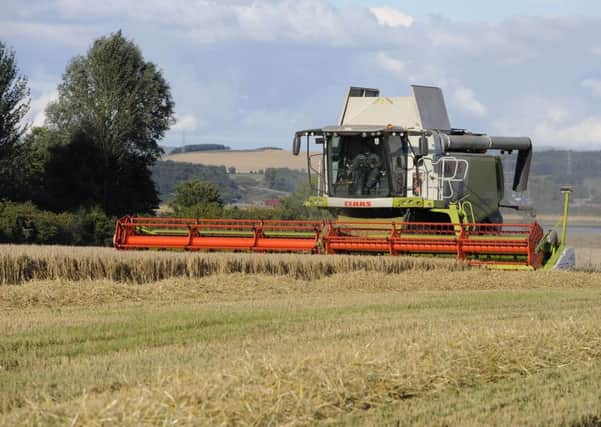Andrew Arbuckle: Brexit gloom is spreading on the farm
This article contains affiliate links. We may earn a small commission on items purchased through this article, but that does not affect our editorial judgement.


There is no doubt a great deal of gloom around. Arable farmers have increased their grumpiness levels as the weather has fluctuated between rain and showers with just the odd glimpse of sunshine. It is just as well that combines now have such a capacity when the sun does shine that the harvest barometer is only registering “catchy harvest” and not “disaster”.
• READ MORE: Farming news
However, cereal growers will face big fuel bills for drying the crop and, from reports around the sector, many malting barley producers will face deductions on their samples as this season has been conducive to skinning peas.
Advertisement
Hide AdAdvertisement
Hide AdDairy farmers are also well down the gloomy spectrum as their cows, deprived of as much sun on their backs as they would normally enjoy and having eaten grass of lower quality than normal, are unsurprisingly producing less milk.
But the greatest gloom in the agricultural world would appear to surround estate agents. It seems the latest fall in farmland values is all about our old friend Brexit, which, as everyone apart from a few UK politicians knows, is surrounded by its own dark mists and uncertain seas.
Land agents are normally the most garrulous and upbeat people but, with a 9 per cent drop in farmland value in the past three months coming on top of previous falls, they have lurched into verbal paralysis. No longer are they stringing superlative phrases together extolling the benefits of investing in land.
Looking at the market and with one eye on their bulging property portfolio, their most upbeat phrases go along the lines of “while higher quality land is still stronger in comparison, lower grade farmland is more difficult to move”.
This is similar to the livestock auctioneer stating “poorer stock were difficult to cash”, which can be translated as “the trade is on its backside”.
There is no joy in reporting this. For many farmers, the value of their farms represents the capital assets of the business and to see this melt away must be difficult.
Advertisement
Hide AdAdvertisement
Hide AdIt may be that all we are witnessing is a re-adjustment of land prices after several years when buying land was one of the best investments. At the peak value in 2014-15 one noted firm said land was the best investment one could make, even beating oil paintings, Ming vases and property in London. With the recent slippage that is no longer the case.
The drop in farmland value has virtually nothing to do with its earning capacity. Many years have passed since that was the case.
James Dyson, the vacuum cleaner inventor, did not buy chunks of prime land in Lincolnshire to increase profits. As long as current fiscal rules apply, his investment in land is all about giving his business stability.
Linked to the decrease in the value of farmland has been a rise in the indebtedness of the farming industry to the banks. Notably, the drop in property value has not been matched by any reduction in borrowing; quite the reverse in fact, with the March 2017 figures showing farm borrowings at £18.16 billion; some 2.8 per cent higher than the previous year.
With seasonal fluctuations in borrowing normally peaking just before harvest being cashed in, today’s indebtedness is bound to be even higher.
By now, I can feel the men in the grey banking suits patting my head and saying: “Nothing to worry about, dear boy. Farmland is still the best collateral you can have and interest rates are low.”
Just remember these are the same people who a decade ago were trading in sub-prime stock and offering over 100 per cent mortgages and remember how quickly that pack of cards collapsed.
The drop in land value and the level of bank borrowing may not give any great concern so far but we are moving into a completely new landscape, economically speaking, and no one, including the political hooligans supposedly running the country, have the slightest idea how it will turn out.